The Aerospace Electrical Inserts Market is estimated to be valued at USD 29.6 billion in 2025 and is projected to reach USD 55.1 billion by 2035, registering a compound annual growth rate (CAGR) of 6.4% over the forecast period.
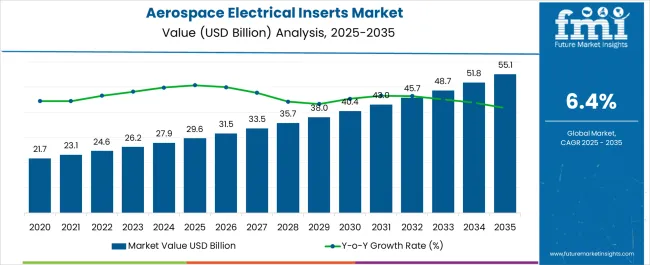
| Metric | Value |
|---|---|
| Aerospace Electrical Inserts Market Estimated Value in (2025 E) | USD 29.6 billion |
| Aerospace Electrical Inserts Market Forecast Value in (2035 F) | USD 55.1 billion |
| Forecast CAGR (2025 to 2035) | 6.4% |
The Aerospace Electrical Inserts Market is experiencing steady expansion, supported by the rising global demand for air travel, modernization of aircraft fleets, and the growing emphasis on in-flight passenger comfort and operational efficiency. Electrical inserts form a critical component of aircraft galleys as they enhance the functionality of food preparation and storage systems, directly contributing to passenger service quality.
Airlines are focusing on upgrading galley systems to meet evolving passenger expectations, while also adhering to stricter aviation safety and efficiency standards. The current market scenario reflects increasing adoption of lightweight and energy-efficient electrical inserts that align with sustainability objectives of airlines and aircraft manufacturers.
The future outlook is being shaped by fleet expansion across emerging markets, refurbishment of existing aircrafts by leading carriers, and the integration of smarter electrical inserts with digital monitoring systems With long-haul travel and narrow-body operations rising in tandem, the market is anticipated to sustain robust growth momentum while continuing to prioritize safety, weight optimization, and enhanced passenger experience.
The aerospace electrical inserts market is segmented by product type, aircraft type, galley type, application, and geographic regions. By product type, aerospace electrical inserts market is divided into Ovens, Coffee & Beverage Makers, Water Boilers, Bun Warmers, Dishwashers, Refrigeration and Chilling Systems, and Private Jets. In terms of aircraft type, aerospace electrical inserts market is classified into Narrow-body aircrafts, Wide-body aircrafts, Very-large body aircrafts, and Private Jets. Based on galley type, aerospace electrical inserts market is segmented into Standard, Customized, and Modular. By application, aerospace electrical inserts market is segmented into Line Fit Aerospace Electrical Inserts and Retrofit Aerospace Electrical Inserts. Regionally, the aerospace electrical inserts industry is classified into North America, Latin America, Western Europe, Eastern Europe, Balkan & Baltic Countries, Russia & Belarus, Central Asia, East Asia, South Asia & Pacific, and the Middle East & Africa.
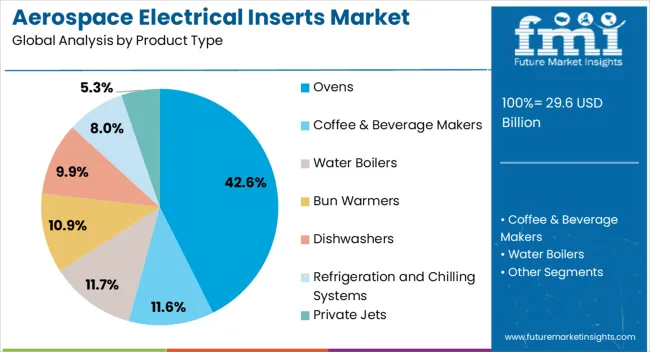
The Ovens product type is projected to hold 42.60% of the overall Aerospace Electrical Inserts Market revenue share in 2025, making it the leading segment among electrical insert categories. The dominance of ovens is being driven by their indispensable role in ensuring hot meal service during flights, a core component of in-flight hospitality. Their widespread adoption is attributed to the ability to deliver consistent performance under varying flight conditions, combined with the integration of compact, lightweight designs that reduce energy consumption while maximizing operational efficiency.
Airlines have increasingly emphasized improved passenger experience through meal service, which has reinforced the significance of ovens in galley configurations. The growth of this segment has also been supported by advancements in thermal management technologies that enhance safety and cooking efficiency.
Additionally, the demand for modular ovens compatible with both short and long-haul operations has contributed to sustained adoption across global carriers As fleet modernization programs continue, ovens are expected to remain the cornerstone of galley electrical inserts, providing a strong base for future growth.
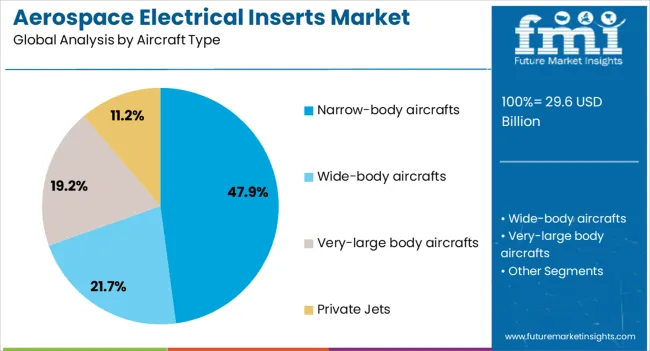
The Narrow Body Aircraft type is anticipated to capture 47.90% of the Aerospace Electrical Inserts Market revenue share in 2025, making it the most significant aircraft type segment. This leading position is being attributed to the rapid expansion of low-cost carriers and short-haul flight routes, where narrow-body aircrafts dominate global operations. The rising demand for fuel-efficient and cost-effective aircraft has intensified the adoption of narrow-body models, directly driving the need for compact and efficient electrical inserts tailored for limited galley space.
Growth in passenger traffic across domestic and regional routes has reinforced the importance of equipping narrow-body aircrafts with functional galley solutions that ensure quality service while optimizing cabin space utilization. Airlines have increasingly focused on achieving operational efficiency by deploying lightweight and modular inserts in narrow-body fleets, further strengthening the segment’s leadership.
Additionally, fleet expansion programs in emerging economies and orders from major airline operators are fueling the continued rise of this segment With air travel demand shifting toward high-frequency, short-haul operations, narrow-body aircrafts are expected to remain central to the market.
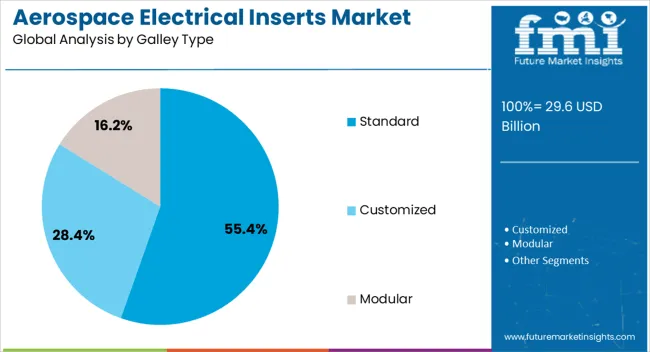
The Standard Galley type is expected to account for 55.40% of the Aerospace Electrical Inserts Market revenue share in 2025, positioning it as the leading galley configuration. This dominance is being driven by its widespread deployment across both narrow-body and wide-body aircrafts, where standard galleys provide an optimal balance of capacity, layout efficiency, and compatibility with a wide range of electrical inserts. Airlines have favored standard galleys due to their proven reliability, ease of maintenance, and ability to accommodate multiple insert types including ovens, coffee makers, and refrigeration units.
Their scalability and flexibility in design have enabled consistent integration across diverse fleets, reducing customization costs for airline operators. The growth of this segment has also been influenced by the high number of retrofitting and refurbishment programs where standard galleys are upgraded with modern electrical inserts to extend aircraft service life.
Furthermore, the preference for standardized configurations has simplified manufacturing and regulatory compliance for aircraft OEMs With rising emphasis on efficiency, safety, and passenger comfort, the standard galley type is projected to sustain its leadership in the market.
Aerospace Electrical Inserts are a key component of galley equipment used on aircrafts to prepare and serve food & beverages to onboard passengers. Aerospace electrical inserts allow the in-flight use of galley equipment such as coffee makers, beverage makers, microwave ovens, bun warmers and water boilers in the galley area.
Reliable operation of the aerospace electrical inserts is necessary since galley equipment requires frequent operation during the flight. Aerospace Electrical Inserts allow the use of galley equipment in a way that is safe for the cabin environment, improving the experience of airline crew and by extension that of the passengers on board.
Given the customized preferences of individual airline operators, manufacturers have to provide flexibility in terms of providing aerospace electrical inserts that suit the customized needs of its clients, as well as adhere to international and industry standards. Aerospace electrical inserts are generally required to adhere to the ATLAS or ARINC standards globally, among others. With increasing competition in the market, manufacturers are rushing to provide aerospace electrical inserts that are reliable, low weight and easily adjustable to new or retrofit aircraft needs.
Considering these aspects of the Aerospace Electrical Inserts, the study of the trends and forecasts of the Aerospace Electrical Inserts market becomes an important read.
With increasing frequency of domestic and international air travel, the demand for aerospace electrical inserts is expected to ramp up at a robust pace. There is growing need for improved catering services as airlines rush to offer differentiation based on in-flight services.
In view of this, the demand for aircraft galley equipment is projected to increase significantly, thus helping growth of aerospace electrical inserts market in the coming years. Also, as galley equipment manufacturers focus on providing lightweight and reliable galley equipment as per demands of the aviation industry, the market for aerospace electrical inserts is also following the same trend.
The increasing demand for customized aircraft interiors is also expected to help the growth of the aerospace electrical inserts market in the near future. The demand for lightweight Aerospace Electrical Inserts is high. With increasing number of international tourists, the number of international and long-haul flights have increased considerably in the recent years. This trend is expected to continue in the coming years, helping drive demand for aerospace electrical inserts.
The demand for Aerospace Electrical Inserts is set to grow at a fast pace in the next five to ten years with the increasing demand from domestic and international airlines, as well as private charter jets. Asia Pacific is expected to be a significant region for the Aerospace Electrical Inserts market, as it is home to fast growing economies that witnessing rapid expansion of their domestic as well as international airline fleets.
Airlines in the region have placed some large new aircraft orders and are focusing on high customer service levels, while there is also increasing demand for aircraft retrofits, helping drive the aerospace electrical inserts market. Europe and North America continue to remain important markets for aerospace electrical inserts, with stable demand and high customization needs. China, India, US, Germany, UK, UAE are some of the key countries for the demand growth of Aerospace Electrical Inserts market.
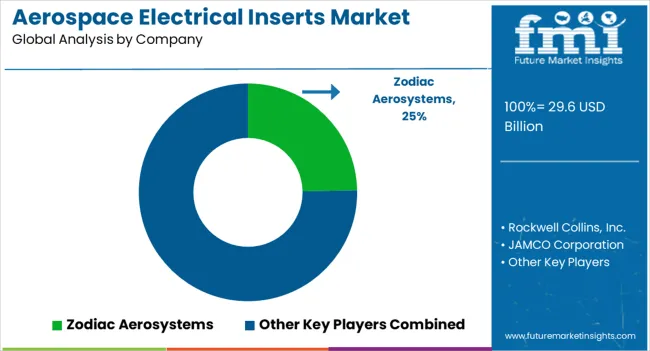
Examples of some of the market participants identified in the Aerospace Electrical Inserts market include,
The research report on aerospace electrical inserts market presents a comprehensive assessment of the market and contains thoughtful insights, facts, historical data and statistically supported and industry-validated market data. It also contains projections using a suitable set of assumptions and methodologies. The research report provides analysis and information according to market segments such as geographies, application and industry.
The report on Aerospace Electrical Inserts is a compilation of first-hand information, qualitative and quantitative assessment by industry analysts, inputs from industry experts and industry participants across the value chain. The report provides in-depth analysis of parent market trends, macro-economic indicators and governing factors along with market attractiveness as per segments. The report also maps the qualitative impact of various market factors on market segments and geographies.
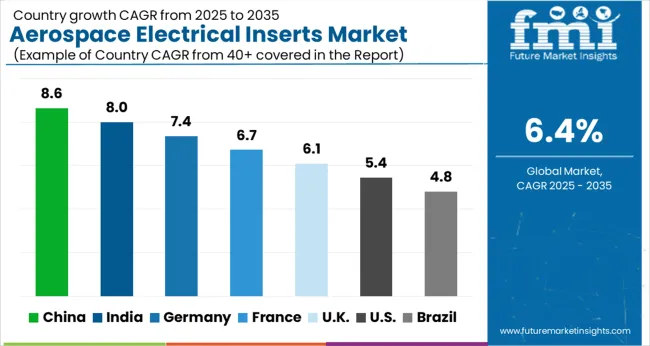
| Country | CAGR |
|---|---|
| China | 8.6% |
| India | 8.0% |
| Germany | 7.4% |
| France | 6.7% |
| UK | 6.1% |
| USA | 5.4% |
| Brazil | 4.8% |
The Aerospace Electrical Inserts Market is expected to register a CAGR of 6.4% during the forecast period, exhibiting varied country level momentum. China leads with the highest CAGR of 8.6%, followed by India at 8.0%. Developed markets such as Germany, France, and the UK continue to expand steadily, while the USA is likely to grow at consistent rates. Brazil posts the lowest CAGR at 4.8%, yet still underscores a broadly positive trajectory for the global Aerospace Electrical Inserts Market. In 2024, Germany held a dominant revenue in the Western Europe market and is expected to grow with a CAGR of 7.4%. The USA Aerospace Electrical Inserts Market is estimated to be valued at USD 10.9 billion in 2025 and is anticipated to reach a valuation of USD 18.5 billion by 2035. Sales are projected to rise at a CAGR of 5.4% over the forecast period between 2025 and 2035. While Japan and South Korea markets are estimated to be valued at USD 1.5 billion and USD 918.3 million respectively in 2025.
| Item | Value |
|---|---|
| Quantitative Units | USD 29.6 Billion |
| Product Type | Ovens, Coffee & Beverage Makers, Water Boilers, Bun Warmers, Dishwashers, Refrigeration and Chilling Systems, and Private Jets |
| Aircraft Type | Narrow-body aircrafts, Wide-body aircrafts, Very-large body aircrafts, and Private Jets |
| Galley Type | Standard, Customized, and Modular |
| Application | Line Fit Aerospace Electrical Inserts and Retrofit Aerospace Electrical Inserts |
| Regions Covered | North America, Europe, Asia-Pacific, Latin America, Middle East & Africa |
| Country Covered | United States, Canada, Germany, France, United Kingdom, China, Japan, India, Brazil, South Africa |
| Key Companies Profiled | Zodiac Aerosystems, Rockwell Collins, Inc., JAMCO Corporation, Diehl Stiftung & Co. KG, Bucher Leichtbau AG, Aerolux Ltd, Korita Aviation (Suzhou) Co. Ltd., DYNAMO Aviation, Loipart AB, and AIM Altitude (AVIC International) |
The global aerospace electrical inserts market is estimated to be valued at USD 29.6 billion in 2025.
The market size for the aerospace electrical inserts market is projected to reach USD 55.1 billion by 2035.
The aerospace electrical inserts market is expected to grow at a 6.4% CAGR between 2025 and 2035.
The key product types in aerospace electrical inserts market are ovens, coffee & beverage makers, water boilers, bun warmers, dishwashers, refrigeration and chilling systems and private jets.
In terms of aircraft type, narrow-body aircrafts segment to command 47.9% share in the aerospace electrical inserts market in 2025.






Our Research Products

The "Full Research Suite" delivers actionable market intel, deep dives on markets or technologies, so clients act faster, cut risk, and unlock growth.

The Leaderboard benchmarks and ranks top vendors, classifying them as Established Leaders, Leading Challengers, or Disruptors & Challengers.

Locates where complements amplify value and substitutes erode it, forecasting net impact by horizon

We deliver granular, decision-grade intel: market sizing, 5-year forecasts, pricing, adoption, usage, revenue, and operational KPIs—plus competitor tracking, regulation, and value chains—across 60 countries broadly.

Spot the shifts before they hit your P&L. We track inflection points, adoption curves, pricing moves, and ecosystem plays to show where demand is heading, why it is changing, and what to do next across high-growth markets and disruptive tech

Real-time reads of user behavior. We track shifting priorities, perceptions of today’s and next-gen services, and provider experience, then pace how fast tech moves from trial to adoption, blending buyer, consumer, and channel inputs with social signals (#WhySwitch, #UX).

Partner with our analyst team to build a custom report designed around your business priorities. From analysing market trends to assessing competitors or crafting bespoke datasets, we tailor insights to your needs.
Supplier Intelligence
Discovery & Profiling
Capacity & Footprint
Performance & Risk
Compliance & Governance
Commercial Readiness
Who Supplies Whom
Scorecards & Shortlists
Playbooks & Docs
Category Intelligence
Definition & Scope
Demand & Use Cases
Cost Drivers
Market Structure
Supply Chain Map
Trade & Policy
Operating Norms
Deliverables
Buyer Intelligence
Account Basics
Spend & Scope
Procurement Model
Vendor Requirements
Terms & Policies
Entry Strategy
Pain Points & Triggers
Outputs
Pricing Analysis
Benchmarks
Trends
Should-Cost
Indexation
Landed Cost
Commercial Terms
Deliverables
Brand Analysis
Positioning & Value Prop
Share & Presence
Customer Evidence
Go-to-Market
Digital & Reputation
Compliance & Trust
KPIs & Gaps
Outputs
Full Research Suite comprises of:
Market outlook & trends analysis
Interviews & case studies
Strategic recommendations
Vendor profiles & capabilities analysis
5-year forecasts
8 regions and 60+ country-level data splits
Market segment data splits
12 months of continuous data updates
DELIVERED AS:
PDF EXCEL ONLINE
Aerospace Fastener Manufacturing Solution Market Size and Share Forecast Outlook 2025 to 2035
Aerospace Fluid Conveyance System Market Size and Share Forecast Outlook 2025 to 2035
Aerospace Adhesives and Sealants Market Size and Share Forecast Outlook 2025 to 2035
Aerospace Forging Materials Market Size and Share Forecast Outlook 2025 to 2035
Aerospace and Defense Cyber Security Market Size and Share Forecast Outlook 2025 to 2035
Aerospace Cold Forgings Market Size and Share Forecast Outlook 2025 to 2035
Aerospace Defense Ducting Market Size and Share Forecast Outlook 2025 to 2035
Aerospace Defense C Class Parts Market Size and Share Forecast Outlook 2025 to 2035
Aerospace Foams Market Size and Share Forecast Outlook 2025 to 2035
Aerospace Robotics Market Size and Share Forecast Outlook 2025 to 2035
Aerospace Engineering Services Outsourcing (ESO) Market Analysis - Size, Share, and Forecast Outlook (025 to 2035
Aerospace DC-DC Converter Market Analysis - Size, Share, and Forecast Outlook 2025 to 2035
Aerospace Fastener Market Analysis Size Share and Forecast Outlook 2025 to 2035
Aerospace 3D Printing Materials Market Size and Share Forecast Outlook 2025 to 2035
Aerospace Radome Market Size and Share Forecast Outlook 2025 to 2035
Aerospace Interior Market Size and Share Forecast Outlook 2025 to 2035
Aerospace Floor Panels Market Size and Share Forecast Outlook 2025 to 2035
Aerospace Tester Market Size and Share Forecast Outlook 2025 to 2035
Aerospace Landing Gear Market Size and Share Forecast Outlook 2025 to 2035
Aerospace Avionics Market Size and Share Forecast Outlook 2025 to 2035

Thank you!
You will receive an email from our Business Development Manager. Please be sure to check your SPAM/JUNK folder too.
Chat With
MaRIA